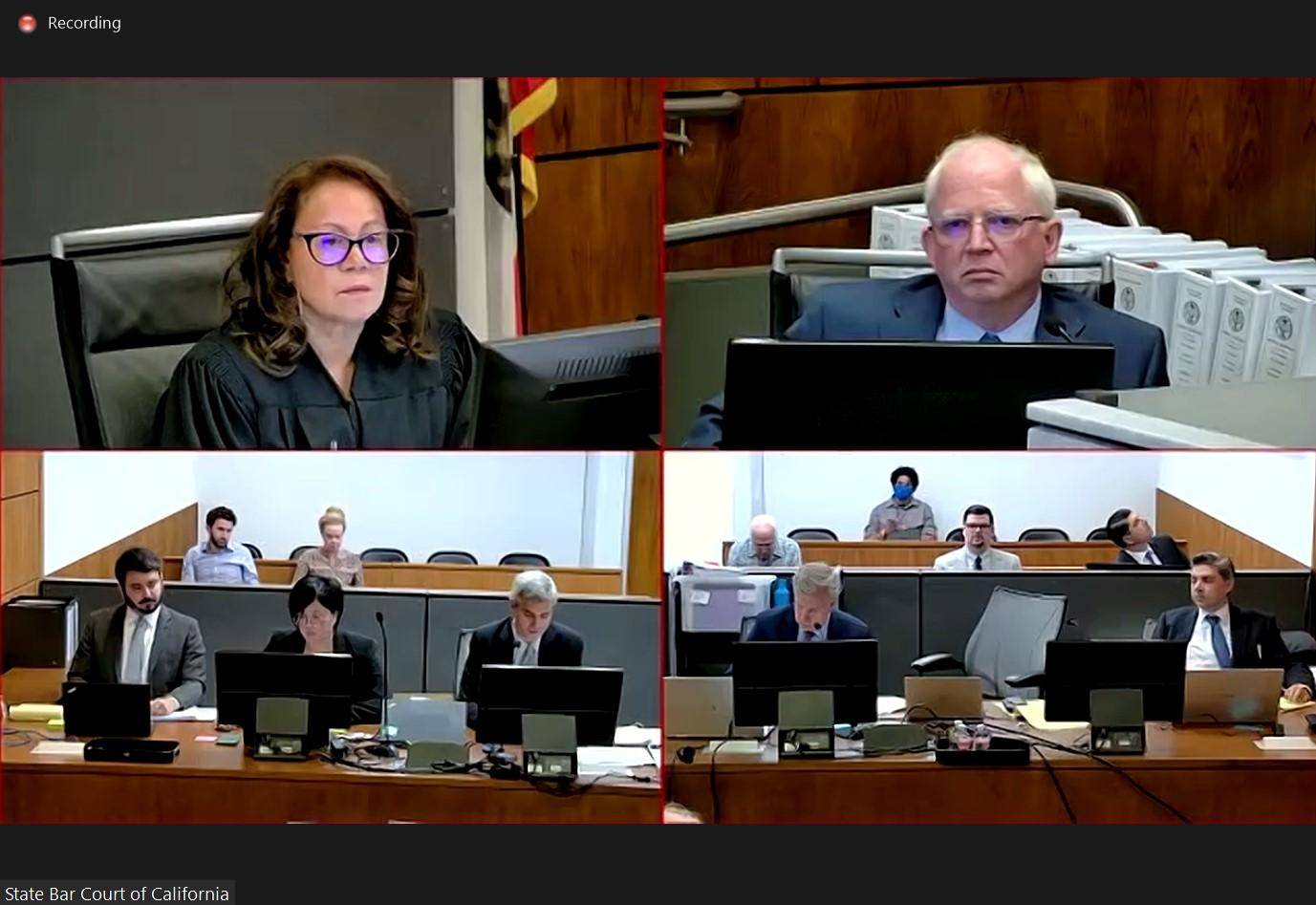The disbarment trial of Donald Trump’s former attorney and constitutional legal scholar John Eastman is in the middle of the seventh week. On Wednesday, retired Department of Defense analyst Ray Blehar returned to the witness stand, discussing his findings that “large injections of votes” were added during the U.S. Senate runoff in Georgia in January 2021. He was followed by Dr. Stanley Young, a statistician who appears to be the only one of Eastman’s witnesses who California Bar Disciplinary Court Judge Yvette Roland has allowed to be designated as an expert witness.
Eastman’s attorney Randy Miller asked Blehar about an email exchange he had with Eastman regarding the runoff, in which Democrat Jon Ossoff defeated Republican incumbent David Perdue. Blehar told Eastman that “large injections of votes (over 10,000) were added” on five occasions during the Georgia Senate runoff race overnight. Roland cut him off, stating that it wasn’t relevant to the charges against Eastman and was “wasting time.” The bar disciplinary charges state that Eastman “made false and misleading statements regarding purported election fraud.”
A lengthy portion of California bar attorney Duncan Carling’s cross-examination of Blehar consisted of asking him about things he hadn’t done, such as research he had not conducted. For example, he asked him, “Have you submitted anything to a peer reviewed publication?” Blehar responded, “I have not. I have not tried to get anything published.”
Carling asked Blehar about an old blog of his called Reveal the Steal, which Blehar hadn’t updated in well over a year. Miller objected to the line of questioning as not being relevant, since Blehar was there to discuss his statistical reports, but Roland overruled him.
Carling questioned Blehar about various statements on his blog, such as “Trump supporters did not breach the Capitol building,” they were “peaceful protesters,” and it was a “false flag attack by Antifa.” Blehar explained that his views on what happened since he wrote that post have become a little more nuanced due to more information coming out, but he still agreed with most of it, pointing out how the Capitol Police could have stopped people from entering the Capitol building by shutting the door. He said while he’s not sure whether Antifa was involved, he believed there were others who entered the Capitol building besides Trump supporters.
Another topic Carling spent a lot of time questioning Blehar about was his use of Edison data to conduct his investigation into election anomalies. Edison data refers to the numbers collected by Edison Research regarding elections, including voter turnout. It is used by the media, including top publications like The New York Times, and distributed by Reuters. Carling repeatedly tried to get Blehar to admit there were issues with using that data, such as suggesting that Edison’s estimates in advance of voter turnout could be wrong.
When Young took the stand, Miller went over his credentials. He was a research scientist advisor at Eli Lilly in statistics, and he also worked at the National Institute of Statistical Sciences. He owns his own company called CG Stat, and is an adjunct professor at North Carolina State University in statistics. Young is a fellow with the American Statistical Association, and has issued close to 100 publications, including a book that has been cited 3,000 times.
Despite his level of expertise, Roland said he would not be designated an expert in regards to election statistics, only statistics generally.
Miller asked Young about a contrast analysis report that he and a team of other statistical PhDs put together regarding the steep increase in votes for president that Joe Biden received in 2020 compared to the number of votes Hillary Clinton received in 2016. Young was the primary author of the report. When Miller previously attempted to ask Blehar and physicist John Droz about the report, who were also authors, Roland and the California bar’s attorney kept stopping them using various objections, mainly that they weren’t “experts.”
Roland said repeatedly that Eastman’s team had not submitted the paperwork on time to have some of Eastman’s witnesses designated experts, but Miller disputed this. Young did not get very far before the trial concluded for the day, so will resume testimony later.
After testifying last week on Thursday and then again on Tuesday, Droz published an article on his Substack about the experience, which discussed the objections to his testimony. He said he observed that one of the questions debated at the trial was whether Eastman had “a reasonable basis to believe that the certified 2020 Presidential election results of some states were likely inaccurate.” Droz said that “as an election integrity expert,” he believed Eastman did.
However, he said “the prosecution did not want anything substantive I had to say about Question #1 to be considered. Since it would have been a burden to try to disprove the accuracy of my testimony (e.g., about the conclusions of our ten Election Integrity Reports, written by my team of very qualified people), they instead focused on a legal technicality to minimize my testimony. They did not want the court to hear or consider any of my evidence of election anomalies that would support Mr. Eastman.” Droz went over all of the reasons why he believed he should have been designated an expert.
On Friday, Kari Lake’s attorney Kurt Olsen will resume testifying, followed by Eastman. There is no trial on Thursday. It is expected to conclude by October 19 or 20, although it could be interrupted by the Georgia prosecution of Eastman. The live stream is here.
– – –
Rachel Alexander is a reporter at The Arizona Sun Times and The Star News Network. Follow Rachel on Twitter / X. Email tips to [email protected].






Who Injected votes five times?